Ford Capri vs VW ID.5 - Differences and prices compared
Compare performance (340 HP vs 340 HP), boot space and price (36300 £ vs 36800 £ ) at a glance. Find out which car is the better choice for you – Ford Capri or VW ID.5?
Costs and Efficiency:
Price and efficiency are key factors when choosing a car – and this is often where the real differences emerge.
Ford Capri has a minimal advantage in terms of price – it starts at 36300 £ , while the VW ID.5 costs 36800 £ . That’s a price difference of around 489 £.
In terms of energy consumption, the advantage goes to the Ford Capri: with 13.80 kWh per 100 km, it’s somewhat more efficient than the VW ID.5 with 15.70 kWh. That’s a difference of about 1.90 kWh.
As for electric range, the Ford Capri performs a bit better – achieving up to 627 km, about 68 km more than the VW ID.5.
Engine and Performance:
Under the bonnet, it becomes clear which model is tuned for sportiness and which one takes the lead when you hit the accelerator.
Both models deliver identical power – 340 HP each.
In acceleration from 0 to 100 km/h, the Ford Capri is barely noticeable quicker – completing the sprint in 5.30 s, while the VW ID.5 takes 5.40 s. That’s about 0.10 s faster.
There’s no difference in top speed – both reach 180 km/h.
Both models offer the same torque – 679 Nm.
Space and Everyday Use:
Cabin size, boot volume and payload all play a role in everyday practicality. Here, comfort and flexibility make the difference.
Both vehicles offer seating for 5 people.
In curb weight, Ford Capri is hardly perceptible lighter – 1914 kg compared to 1963 kg. The difference is around 49 kg.
In terms of boot space, the Ford Capri offers slight more room – 572 L compared to 549 L. That’s a difference of about 23 L.
In maximum load capacity, the VW ID.5 performs slight better – up to 1561 L, which is about 51 L more than the Ford Capri.
When it comes to payload, Ford Capri slight takes the win – 587 kg compared to 549 kg. That’s a difference of about 38 kg.
Who comes out on top?
Overall, the Ford Capri shows itself to be shows small but notable strengths and secures the title of DriveDuel Champion.
It convinces with the more balanced overall package and proves to be the more versatile choice for everyday use.
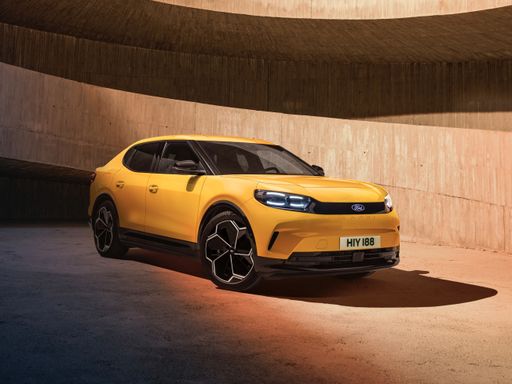
Ford Capri
Costs and Consumption
View detailed analysis
Engine and Performance
View detailed analysis
Dimensions and Body
View detailed analysis
Ford Capri
The Ford Capri turned the family car into something cheekily sporty, with a long, rakish profile that still promises fun at a glance. Today it lives on as a lovable classic — easy to tinker with, enjoyable to drive and guaranteed to raise smiles at any meet.
details
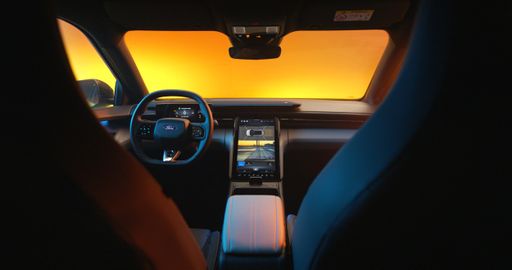
VW ID.5
VW ID.5 dresses electric power in a sleek, coupe-like profile that turns sensible motoring into something a touch more stylish and smug. Inside it’s spacious and user-friendly, with calm, confidence-inspiring driving that suits buyers who want EV simplicity without the sci‑fi theatrics.
details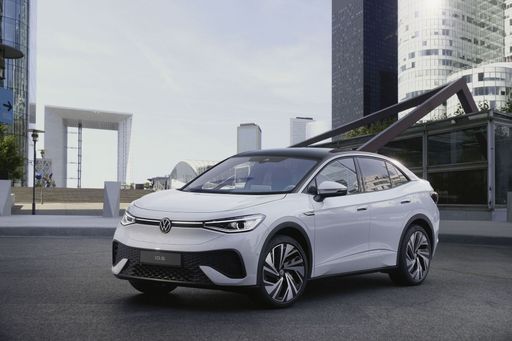
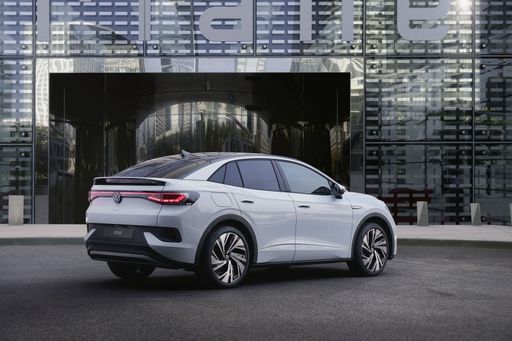
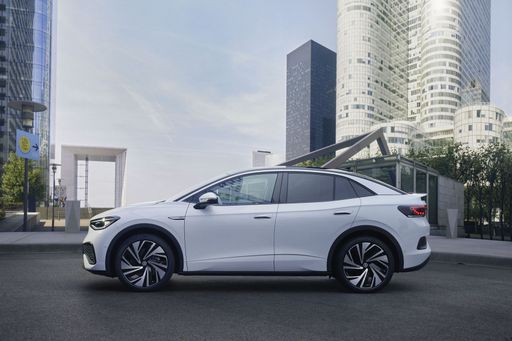
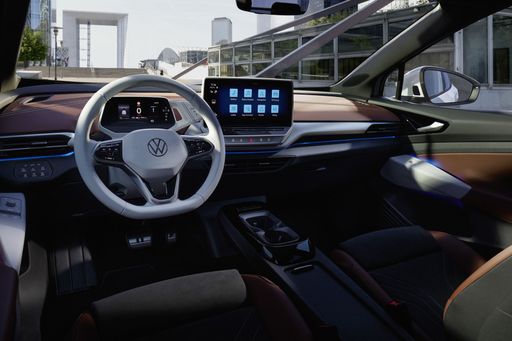
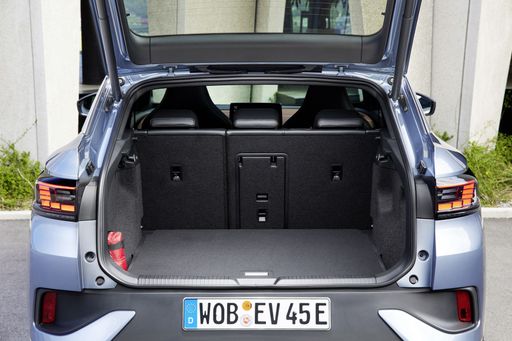
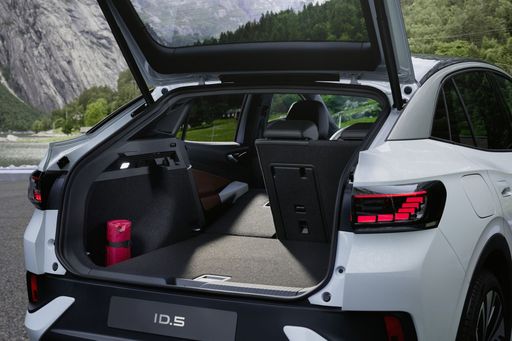
Costs and Consumption |
|
|---|---|
|
Price
36300 - 50900 £
|
Price
36800 - 48400 £
|
|
Consumption L/100km
-
|
Consumption L/100km
-
|
|
Consumption kWh/100km
13.8 - 16.4 kWh
|
Consumption kWh/100km
15.7 - 16.6 kWh
|
|
Electric Range
374 - 627 km
|
Electric Range
363 - 559 km
|
|
Battery Capacity
52 - 79 kWh
|
Battery Capacity
52 - 79 kWh
|
|
co2
0 g/km
|
co2
0 g/km
|
|
Fuel tank capacity
-
|
Fuel tank capacity
-
|
Dimensions and Body |
|
|---|---|
|
Body Type
SUV
|
Body Type
SUV
|
|
Seats
5
|
Seats
5
|
|
Doors
5
|
Doors
5
|
|
Curb weight
1914 - 2174 kg
|
Curb weight
1963 - 2233 kg
|
|
Trunk capacity
567 - 572 L
|
Trunk capacity
549 L
|
|
Length
4634 mm
|
Length
4582 - 4599 mm
|
|
Width
1872 mm
|
Width
1852 mm
|
|
Height
1626 mm
|
Height
1601 - 1618 mm
|
|
Max trunk capacity
1505 - 1510 L
|
Max trunk capacity
1561 L
|
|
Payload
570 - 587 kg
|
Payload
517 - 549 kg
|
Engine and Performance |
|
|---|---|
|
Engine Type
Electric
|
Engine Type
Electric
|
|
Transmission
Automatic
|
Transmission
Automatic
|
|
Transmission Detail
Reduction Gearbox
|
Transmission Detail
Reduction Gearbox
|
|
Drive Type
Rear-Wheel Drive, All-Wheel Drive
|
Drive Type
Rear-Wheel Drive, All-Wheel Drive
|
|
Power HP
170 - 340 HP
|
Power HP
170 - 340 HP
|
|
Acceleration 0-100km/h
5.3 - 8.7 s
|
Acceleration 0-100km/h
5.4 - 8.9 s
|
|
Max Speed
160 - 180 km/h
|
Max Speed
160 - 180 km/h
|
|
Torque
310 - 679 Nm
|
Torque
310 - 679 Nm
|
|
Number of Cylinders
-
|
Number of Cylinders
-
|
|
Power kW
125 - 250 kW
|
Power kW
125 - 250 kW
|
|
Engine capacity
-
|
Engine capacity
-
|
General |
|
|---|---|
|
Model Year
2024 - 2025
|
Model Year
2024 - 2025
|
|
CO2 Efficiency Class
A
|
CO2 Efficiency Class
A
|
|
Brand
Ford
|
Brand
VW
|
Is the Ford Capri offered with different drivetrains?
The Ford Capri is offered with Rear-Wheel Drive or All-Wheel Drive.




